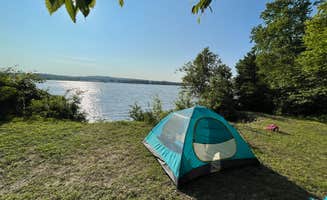Tent camping near Quogue, New York requires advance planning due to limited options and seasonal restrictions. Most campgrounds in the region operate from April through October, with peak season running Memorial Day through Labor Day when reservations become essential. The coastal location brings consistent sea breezes that can create challenging conditions for improperly secured tents, particularly at oceanfront sites where wind speeds commonly reach 15-25 mph.
What to do
Beach exploration: Watch Hill Fire Island Campground provides access to both ocean beaches and protected bay environments. Campers can collect shells, observe wildlife, or simply relax along the shoreline. Battle Row Campground offers a central location for accessing multiple Long Island beaches while providing a convenient base camp. One camper noted, "This campground is old and there isn't much there, but it depends on why you're camping whether that matters to you. We wanted to be by the beach and we were."
Fishing opportunities: Many campsites near Quogue allow direct access to prime fishing locations. Tidal patterns affect shoreline fishing success, with locals recommending fishing during the first and last hours of incoming tides. Selden Neck State Park offers riverside tent camping where "at low tide, a couple of beaches emerge to play on," according to one reviewer, making it ideal for families who want to combine camping with fishing.
Hiking trails: Several campgrounds connect to trail systems suitable for day hikes. Gillette Castle State Park Campground combines camping with historical exploration, as one camper explains: "Great place for a hike or a picnic. Castle has tours at certain times." The park features over 3 miles of hiking trails with Connecticut River views.
What campers like
Isolated beach camping: For those seeking seclusion, backcountry permits provide access to more remote beach camping locations. Fire Island National Seashore offers this experience where, according to one visitor, "So it's about a mile to three miles to the closest campsites on the western side. Very secluded, and peaceful weekend by the water." The western wilderness area provides more isolation than established campgrounds.
Wildlife viewing: The coastal environment supports diverse wildlife observation opportunities throughout the camping season. Birds, deer, and marine life are commonly spotted from campsites. Hidden Lake Farm provides a "Quiet and Private" setting according to reviews, with only 5 tent sites available, creating an intimate nature experience.
Water access: Many campsites offer direct water access for swimming, kayaking and paddleboarding. Hurd State Park River Camping sits alongside the Connecticut River, allowing campers to enjoy water activities directly from their sites. At Gillette Castle State Park Campground, one reviewer appreciates that "You can swim and fish and relax all day!"
What you should know
Insect preparation: Beyond standard mosquito repellent, sand fly and greenhead fly protection becomes essential during summer months. Screened shelters for eating areas prove invaluable. One visitor to Watch Hill Fire Island Campground warned, "We were getting attacked by mosquitoes and horseflies the entire weekend. Even with the bug spray, the relief didn't last long. We couldn't even enjoy our meals at camp because it was that bad. Def bring a shelter or a canopy with a mosquito net!!!"
Transportation logistics: Many campgrounds require ferry access or boat transportation to reach sites, necessitating careful packing. At Watch Hill, "It's a bit of a walk to camp site but all on board walk (we took to carts full of stuff)," explains one camper, highlighting the need for appropriate gear transport solutions.
Fire regulations: Restrictions vary significantly between campgrounds. While Battle Row Campground allows fires, "There are NO fire pits, you must bring your own. Fires are allowed but you must have a fire container or bucket for your fire off of the ground." Fire Island National Seashore prohibits all campfires due to conservation efforts.
Tips for camping with families
Beach safety knowledge: Oceanfront camping requires understanding rip current safety and tide patterns. Families should study tide charts before setting up campsites near the water line. Chapman Pond Preserve offers a safer option with "Good tent platforms, picnic tables and outhouse. CT river within view," as one visitor reports.
Educational programs: Several campgrounds offer ranger-led activities specifically designed for children. At Watch Hill Fire Island Campground, "There are park rangers on site and have excellent programs for kids," making it ideal for educational family outings.
Playground access: For families needing structured play areas, select campgrounds maintain playground facilities. Battle Row Campground features a "playground is new and centrally located" which provides entertainment options beyond natural surroundings.
Tips from RVers
Limited hookup availability: Most tent-focused campgrounds near Quogue offer minimal or no RV hookups. Those that do typically have size restrictions limiting vehicles to under 30 feet. Battle Row Campground provides water hookups for RVs but no electrical connections, making generator-free camping necessary.
Ferry restrictions: RV camping options become severely limited when ferry access is required. Most Fire Island ferries cannot accommodate recreational vehicles of any size, restricting access to tent camping only at island locations.



